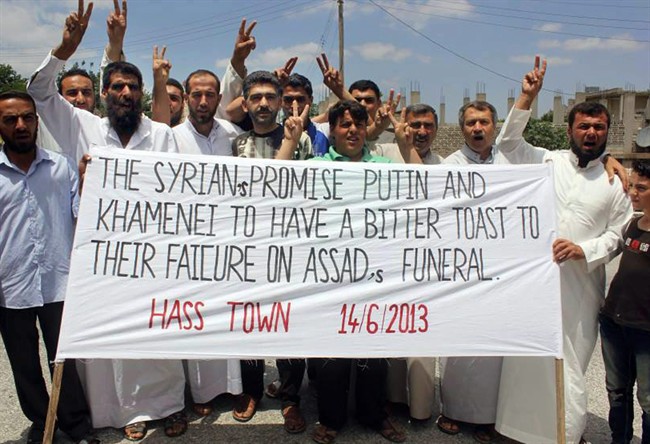It was last week when President Barack Obama said his “red line” had been crossed and government officials said the U.S. would send arms to help Syrian rebels.

The repercussions of Obama’s statements, after he said the U.S. had conclusive evidence the regime of Bashar al-Assad had used chemical weapons, continued through the weekend and into Monday as the G8 summit got under way in Northern Ireland.
Foreign Policy columnist Marc Lynch said the announcement will have “only a marginal impact on the Syrian war.”
“The real risks lie in what steps might follow when it fails,” he wrote.
“The dominant idea is that these arms will help to pressure Assad to the bargaining table, strengthen the “moderate” groups within the opposition while marginalizing the jihadists in the rebellion’s ranks, and assert stronger U.S. leadership over the international and regional proxy war. Much of it sounds like magical thinking. History does not suggest that this will work out as planned,” Lynch said.
While British Foreign Secretary William Hague said the U.K still had no plans to follow the Americans’ lead, he tried to assuage fears arms could fall into the hands of extremists.
The Guardian reported Hague called Syria “the worst human tragedy of our times and on a trajectory to get worse.”
London Mayor Boris Johnson wrote an editorial, published in The Telegraph on Monday, saying it is “too late to save Syria – this conflict can never be won.”
- Canada refused to repatriate woman from ISIS camp because she can’t be arrested: internal memo
- Haiti’s PM resigns, paving way for new elections in violence-plagued nation
- U.S. tourist faces 12-year sentence for bringing ammo to Turks and Caicos
- Is Trump immune in the 2020 election case? What to watch for during hearing
He is flat out against the option of sending arms – he’s among those who fear arms going to extremist groups — and would rather foreign powers push for a ceasefire.
“How are we meant to furnish machine guns and anti-tank weapons to one set of opposition forces, without them ending up in the hands of men like the al-Qaeda-affiliated thugs,” Johnson asked.
He said Syria is can’t be used as “an arena for geopolitical point-scoring or muscle-flexing, and we won’t get a ceasefire by pressing weapons into the hands of maniacs.”
Prime Minister Stephen Harper said Sunday G8 nations, minus Russia, would need to find a way to bring about an end to the conflict, reiterating that Canada is not at present “contemplating arming the opposition in Syria.”
He told Russian Prime Minister it was on its own among the other nations at the summit, in regards to supporting the Assad regime.
“This is G7 plus one. OK, let’s be blunt,” Harpers said during a meeting with Irish Prime Minister Edna Kenny. “That’s what this is, G7 plus one”
Obama and Putin agreed to disagree on Monday. The leaders conceded that they both want to see an end to violence and stop the use of chemical weapons, but they have a “different perspective” on how to handle the two-year-old civil war.
National Post columnist Kelly McParland that while the conflict “has been tilting Assad’s way in recent weeks, and likely will continue to do so in the face of the West’s ongoing inability to act in a forceful and united way.”
“The Russian president also knows the western position is more talk than action, that Washington isn’t eager for a direct confrontation with Moscow and that Obama himself is not fully committed to the stronger action he’s proposing for others,” McParland wrote.
While no foreign military has yet to put soldiers on the ground – although Lebanese militant group Hezbollah has sent armed forces into the country to help Assad – that could soon change.
There was word on Sunday that Iran, which just elected a new president on Friday, is preparing to send thousands of soldiers to help the Assad regime.
Columnist Robert Fisk, in London’s The Independent on Sunday, said the decision to send at least 4,000 troops to Syria was made before Iranians headed to the polls, to elect reformist Hasan Rowhani.
“Iran is now fully committed to preserving Assad’s regime, according to pro-Iranian sources which have been deeply involved in the Islamic Republic’s security, even to the extent of proposing to open up a new ‘Syrian’ front on the Golan Heights against Israel,” Fisk wrote in his column.
For his part, President-elect Rowhani said he was against foreign interference in the Syrian civil war.
“We are opposed to foreign intervention,” he said in his first press conference since being elected. “We hope peace and tranquility will return to Syria through co-operation with countries of the region and world.”
*With files from The Associated Press and The Canadian Press




Comments